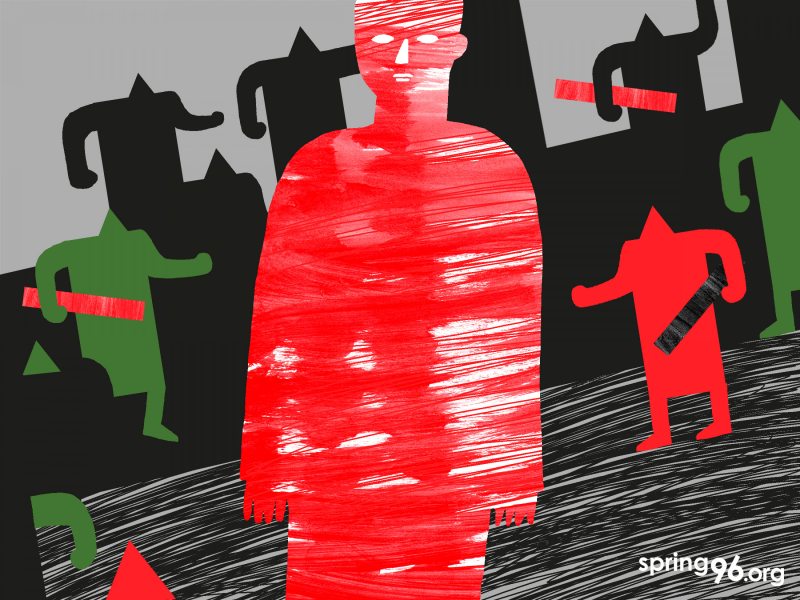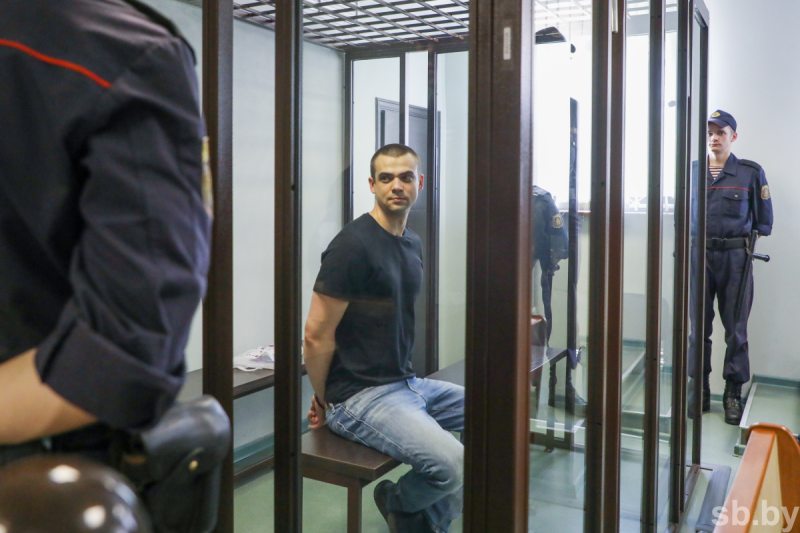650 people in Belarus convicted of "inciting other social hatred"
After 2020, Article 130 of the Criminal Code (inciting other social hatred) has become a common tool of the regime to combat dissidents. The cases under Article 130 of the Criminal Code mainly concern statements on the Internet — publications criticizing the regime and negative statements about government representatives, comments on social media and public chats, transmitting information about security forces and officials to protest structures. But sometimes this article is used more widely. Under this article, human rights activist Nasta Loika was tried for her report and artist Ales Pushkin, for his paintings. 650 people have already been convicted in Belarus for this, 106 of them are women. Viasna reports the people persecuted and the reasons for convictions.

Who is persecuted under Article 130 of the Criminal Code?
As human rights defenders noted in the report Restrictions on freedom of expression under the pretext of combating extremism and terrorism, in practice, Article 130 of the Criminal Code is selectively used for persecution to protect government institutions. As a result, the legitimate goal of protecting vulnerable groups is replaced by the protection of government representatives — employees of internal affairs agencies, military personnel, etc., who, on the contrary, belong to a privileged group.
The cases under Article 130 of the Criminal Code mainly concern statements on the Internet — publications criticizing the regime and negative statements about government representatives, comments on social media, and public chats.
In some cases, criminal cases do not concern public statements, but the transfer of personal data of government representatives to various protest structures. The "incitement of other social hatred" implies the public dissemination of information about the involvement of civil servants and law enforcement officials in human rights violations. People were persecuted for transferring the personal data of government representatives to the Black Book of Belarus — a protest Telegram channel.
What are the trials under Article 130 like?
Such cases are heard in closed sessions. According to human rights activists, a closed trial in these cases grossly violates the accused’s procedural rights. It hinders the proper assessment of the credibility, sufficiency, and admissibility of any evidence for the prosecution.
From December 2 to 6 alone, 12 people were tried across Belarus.
Article 130 of the Criminal Code criminalizes a wide range of statements, not limited to the most serious forms of incitement. The standard linguistic examination concludes that "the statement contains a negative assessment", which is usually used by courts as proof of guilt.
The Black Book of Belarus case
The Black Book of Belarus case is one of the most notorious criminal cases after the events of 2020. Dozens of people were detained for transferring personal data of people who, according to the initiative, are involved in election fraud, violence against peaceful protesters, and repression in Belarus to a chatbot of a Telegram channel of the same name. The participants of the initiatives were discovered because, from the very beginning, an employee of the Main Directorate for Combating Organized Crime and Corruption (GUBAZiK) infiltrated the initiative.
The detained were tried under Article 130. Among them, there were bank employees, former prosecutors, policemen and investigators, officials, a lawyer, a former lieutenant colonel of justice, a forensic expert, a musician, and an artist. Some of them were beaten and tortured during the detention by GUBAZiK employees.
The administrators of the Black Book of Belarus were also convicted of "inciting other social hatred." For example, on May 6, 2022, Sofia Sapega was convicted in the Hrodna Regional Court to six years in a penal colony under two articles of the Criminal Code — Part 3 of Article 130 (incitement to hatred as part of a group of persons) and Part 1 of Article 179 (illegal collection of information about private life). On June 7, 2023, Sofia was released by pardon.
In January 2023, five people were convicted in absentia for administering the Black Book of Belarus Telegram channel. It was the first trial in absentia in Belarus.
Trials in absentia
In 2023, it became a common practice to bring charges in absentia under Article 130 of the Criminal Code against opposition politicians and other public figures criticizing the current authorities. Under Article 130 of the Criminal Code, together with other charges, 56 people were convicted in almost two years. Among those convicted of "inciting other social hostility" are democratic leader Sviatlana Tsikhanouskaya, Belarusian political scientist Ryhor Astapienia, psychologist and former head of the Hrodna hospice liquidated by the authorities Volha Vialichka, journalist and political scientist Yury Drakakhrust, head of the National Anti-Crisis Management Pavel Latushka, journalist Hanna Liubakova, bloggers Andrei Pavuk, and Volha Pavuk, chief adviser to the democratic leader Sviatlana Tsikhanouskaya Franak Viachorka.
The Zeltser case
Another high-profile case where the detainees were tried under Article 130 of the Criminal Code is the Zeltser case. At least 124 people were convicted for comments condemning the actions of KGB officials. The vast majority of them were deprived of their liberty. Almost all served their sentences completely in inhumane conditions and were released at the end of the term.
Among the convicts is sound engineer Artsiom Zadrutski. He was convicted for the word "punisher" in comments on social media.
Persecution of a human rights defender for a report

- Nasta Loika. Photo from the archive of Nasta's friend
Nasta Loika was detained in October 2022 and later charged under Article 130 of the Criminal Code (inciting other social hatred). The reason for this was the alleged participation of the human rights defender in writing a report on the persecution of the anarchist community in Belarus in 2018: the report gives a critical assessment of the activities of police officers.
On June 20, 2023, the Minsk City Court handed down a verdict in the case of political prisoner and human rights activist Nasta Loika: she was sentenced to seven years in a general security penal colony. Almost at the beginning of the court session, the trial was closed, so the details of the criminal case and Nasta's position are unknown.
Persecution of an artist for a painting

Artist Ales Pushkin was also tried under Article 130 of the Criminal Code. The man died in prison while serving his sentence. The reason for the prosecution under Article 130 of the Criminal Code was the artist placing the portraits of the Belarusian anti-Soviet resistance leaders Michal Vitushka, Usevalad Rodzka, and Yauhen Zhykhar at an exhibition in Hrodna, which was interpreted as "rehabilitation of Nazism". The trial of the artist began on March 10, 2022. According to Viasna human rights activists, Ales Pushkin prepared 23 pages of his last word, but because the court was closed, the public did not hear it. Under Articles 130 and 370 (desecrating state symbols) of the Criminal Code Ales Pushkin was sentenced to five years in a penal colony.
On July 11, 2023, Ales died at night in the intensive care unit, where he was taken from the Hrodna prison, due to untimely medical care for a perforated ulcer.
Persecution of Eduard Babaryka

- Eduard Babaryka at the trial on July 5, 2023
Eduard Babaryka, the head of the initiative group of Viktar Babaryka, a candidate for the presidency, was also tried for "inciting other social hatred." This charge was brought against him after a year and a half of detention in a pre-trial detention center, but its essence is unknown.
It is known that Eduard Babaryka did not plead guilty.
On July 5, 2023, the Minsk Regional Court announced the verdict of political prisoner Eduard Babaryka: eight years in a penal colony. He was found guilty under three articles of the Criminal Code: Article 342 of the Criminal Code (organization and preparation of actions grossly violating public order or active participation in them), Article 243 of the Criminal Code (evasion of taxes and fees), and Article 130 of the Criminal Code (incitement to hatred or hostility).

















